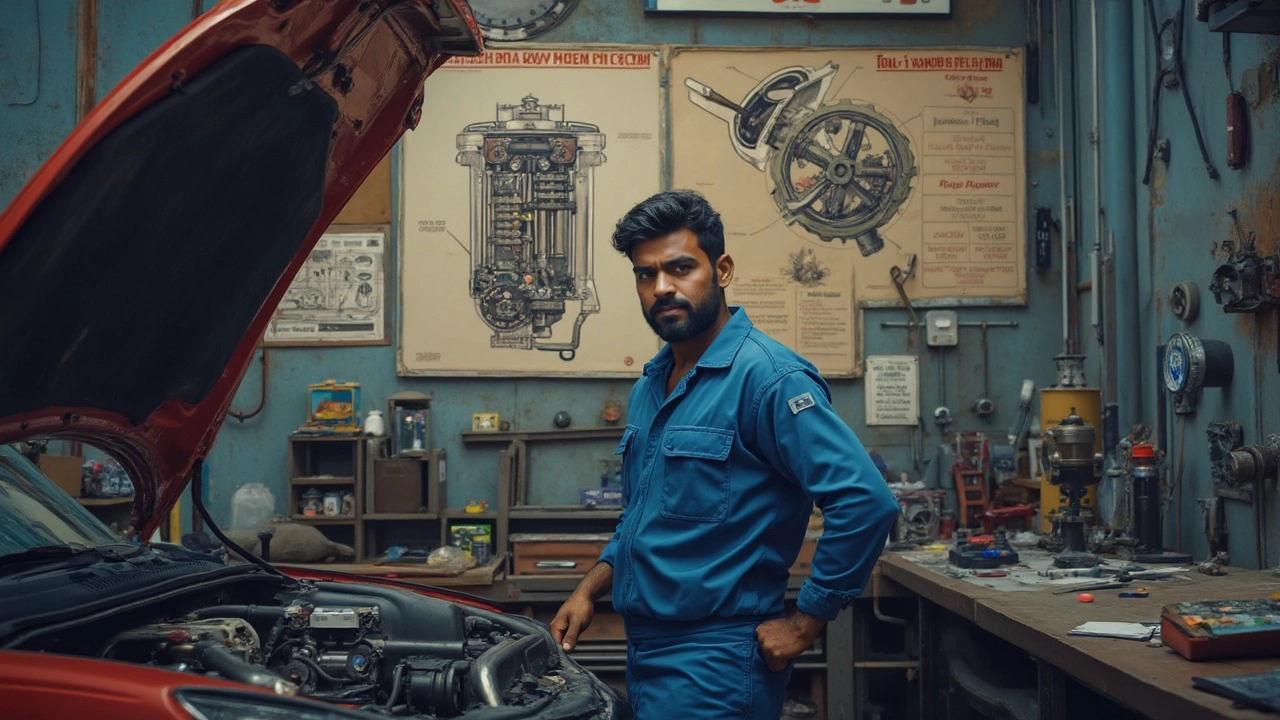 Apr, 4 2025
Apr, 4 2025
Ever had that dreadful moment when your car suddenly decides it's done working properly? A bad fuel pump might just be the culprit. It's frustrating, but understanding a few things about how your car drinks its fuel can really help you out.
The fuel pump is like your car's heart, pumping the gas from the tank to the engine. Without it, well, it's like trying to jog after skipping breakfast—your car just won't have the energy to go anywhere. Problems with the pump can mean your ride sputters or stalls suddenly, and nobody enjoys being stuck on the side of the road.
Bizarre noises from under the hood or weird jerks and jolts while driving? Your car might be giving you signs that the fuel pump is on its last legs. But can you still drive around safely with it acting all moody? That's the big question we're tackling here. Stay tuned as we break down what to look for, what you can do right now, and when it's time to park it for good.
- What Does a Fuel Pump Do?
- Signs Your Fuel Pump Is Going Bad
- Can You Drive With a Bad Fuel Pump?
- Quick Temporary Fixes
- The Risks of Ignoring a Bad Fuel Pump
- When to Get Professional Help
What Does a Fuel Pump Do?
Imagine your car as a living, breathing machine. Now, picture the fuel pump as its heart. It's a small but mighty component that keeps your ride moving forward by delivering fuel from the tank to the engine. Without it, your car simply wouldn't budge.
In most vehicles, the fuel pump is located inside the fuel tank, and it’s responsible for pressurizing the gas and sending it through the fuel lines. This pressure is vital. It ensures the engine has a constant and reliable supply of gas, which, in turn, powers your vehicle. No fuel pump, no go!
There are primarily two types of fuel pumps: mechanical and electric. Mechanical pumps are usually found in older models and are driven by the engine. Electric pumps, on the other hand, are more common in modern cars, providing more efficient and consistent fuel flow.
Really, the fuel pump does more than just 'pump' fuel; it helps with emissions, too. A good working pump ensures the engine burns fuel efficiently, which means fewer emissions and better gas mileage. Now that’s a win-win!
For a little context, here's a quick look at how fuel pumps have evolved over the last few years:
| Year | Common Fuel Pump Types | Average Life Span (Years) |
|---|---|---|
| 1990s | Mechanical | 10 |
| 2000s | Electric | 10-15 |
| 2020s | Electric (Advanced) | 15+ |
Pretty cool, right? Understanding how the fuel pump works gives you a bit more control over its maintenance and repair. Plus, if you're ever unlucky enough to have a fuel pump go bad, you'll be ahead of the game knowing how crucial it is to your car's health.
Signs Your Fuel Pump Is Going Bad
Your car may not speak, but when the fuel pump starts failing, it sure sends SOS signals. Notice any strange behavior while driving? That could be your vehicle's way of waving a red flag.
First off, you might experience a sudden loss of power while accelerating. Imagine trying to zoom forward, and the car just hesitates or feels sluggish. That's usually a sign that the pump isn't delivering enough fuel to the engine.
Another common indicator is the sputtering and coughing noise coming from the engine. If your car sounds like it's got a bad cold, your fuel pump might be struggling to keep up.
Weird fuel efficiency? When your pump's on the fritz, it can mess with how much gas your car uses. You might notice you're visiting the gas station more often than usual.
"A failing fuel pump can lead to a significant drop in fuel economy, making it one of the first things to check during unexplained performance issues," says Automotive Engineer, Mike Larson.
Besides these, keep an ear out for any whining noises from the fuel tank. This sound isn't normal and can be an early warning sign.
Should you ignore these signs and hope for the best? Absolutely not. Addressing these symptoms early can save you a ton of trouble down the road.
| Symptoms | Risk |
|---|---|
| Loss of Power | Engine stalling while driving |
| Sputtering Engine | Intermittent stalling or sluggishness |
| Low Fuel Efficiency | Increased costs and fuel waste |
So, be vigilant and listen to your car—it might just save you from getting stranded on your next outing!
Can You Drive With a Bad Fuel Pump?
So, you've got a sneaky suspicion your fuel pump is acting up. The million-dollar question: can you keep cruising, or should you pull over and call for backup? Let's break it down.
First things first, if your fuel pump is on the fritz, your car might start acting like a drama queen. You'll notice that your ride struggles to start, or maybe it just stalls out when you're idling at a red light. Even when the engine does manage to kick into gear, you might feel it's lacking power or surprise you with jerks and jumps, making it difficult to drive smoothly.
Technically, you may still drive, but it's kind of like playing with fire—dangerous and not really worth it in the long run. Continuing to drive with a bad fuel pump can lead to more serious issues, like engine misfires or even permanent damage, which translates into pricey repairs. Plus, if the pump fails completely, you could find yourself stranded at the worst possible moment.
It's also crucial to consider the safety aspect. A faulty pump can cause unpredictable behavior, especially at higher speeds. Suddenly losing power on the highway is no fun, and it can be downright hazardous.
If you absolutely must drive, keeping trips short and slow is your best bet. Keep the gas tank at least a quarter full to reduce strain on the fuel pump, and avoid heavy acceleration. But let's be real—it's a smart move to take your car to a professional sooner rather than later to avoid bigger headaches.

Quick Temporary Fixes
So your car's acting up because of a dodgy fuel pump, and you need a quick solution? Here's the lowdown on some temporary fixes that might just save you a tow.
First up, there's the classic tap. Sometimes, giving the fuel pump a gentle tap can get it to behave temporarily. No kidding! This might help if the pump's jammed. Raps with a small tool like a hammer or wrench can nudge it to life, just don't go overboard.
If that doesn't work, you might want to inspect the fuel filter and clean any obvious blockages. A clogged fuel pump won't do its job properly, so check if some debris has found its way in. Cleaning this out could give your car some much-needed relief.
Now, here's a tip for those pesky situations when you're desperate: try keeping the tank at least half full. This can help reduce the strain on a weak fuel pump. Ever heard of the 'gravity trick'? Parking your car on a hill with the frontend higher than the backend might also provide a bit of relief. It sounds quirky, but anything that gets fuel moving towards the pump helps when things are dire.
A last resort might be to fit a fuel cleaner additive. It’s no miracle worker, but sometimes these can break down minor clogs and make operation smoother. Still, it's a stopgap solution, not a lasting one.
Remember, these are just quick fixes to keep you rolling for now. A bad fuel pump is like a ticking clock—you’ve bought some time, so use it wisely to plan a proper repair.
The Risks of Ignoring a Bad Fuel Pump
Thinking you can ride it out with a sketchy fuel pump? Not the best idea. Ignoring it could lead to some real headaches, both for you and your wallet. Let's break it down.
First off, if you're driving with a bad fuel pump, you’re likely to face sudden stalls. Imagine being on a busy highway when that happens—not a fun scenario. It’s risky for both your safety and everyone else's.
Next up, a failing pump can mess up your engine's performance big time. It'll struggle to get the right amount of fuel, leading to poor acceleration, weird noises, and that dreaded check engine light flashing on your dashboard. If left unchecked, this can cause long-term engine damage, which could mean major repairs or even a full engine replacement. And trust me, that's not a cheap fix.
Here's where your gas mileage takes a hit. With a faulty pump, your car might start gobbling up more gas than usual, sticking you with higher fuel bills. So you're basically paying more just to keep a problematic car running.
Ultimately, ignoring a failing pump can lead to complete breakdowns. That's when your car won't start at all, and we all know how inconvenient it is to deal with an immovable vehicle in the driveway or worse, when you're not even home.
You might think it'll hold out a bit longer, but playing chicken with a bad fuel pump isn't a game you want to risk. Think about addressing the issue before it snowballs into a much costlier affair.
When to Get Professional Help
Alright, so you've done your detective work. Your car is acting up, and you've got a hunch that the fuel pump is throwing a tantrum. But how do you know when it's time to call in the pros? It's tempting to keep pushing your ride a bit further, but it could turn a small hiccup into a full-on breakdown.
If you're seeing or feeling symptoms like your car stalling, struggling to start, or flat-out refusing to rev up, these are red flags. If you've putt-putted to a gas station more times than you can count, it's a smart move to let a mechanic take over. Simply wondering if you can drive around with a bad fuel pump is a signal you might need professional backup.
Here's the real kicker: ignoring a wonky fuel pump might lead to costly damage. For example, if the pump's failing, it could strain your engine. Over time, this might wear down the internal parts. And engines aren't cheap, trust me. Mechanics have the right tools to check your fuel pump, and they can confirm if it's just a fuel filter issue or something more serious.
Many garages offer free diagnostic checks. It might seem annoying to schedule a visit, but think of it as a little trip to the doctor for your car. Better safe than sorry, right? While some tiny repairs might have DIY fixes, a fuel pump is not one of those. Get some expert eyes on it. Plus, mechanics can help spot other potential issues that could save you money in the long run.
If budgets are tight, look for shops offering payment plans. This way, you're not caught off guard by a massive bill. And on the upside, it's a chance to be surrounded by the rich smell of motor oil and the comforting sound of tools clattering—a gearhead's paradise!